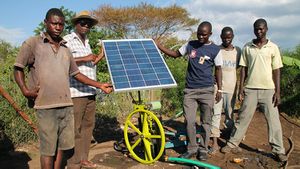Sunflower Pump: Asset-Financed Solar Irrigation Pumps for Smallholder Farmers
Overview
|
Innovator |
||
|
Project |
Sunflower Pump: Asset-Financed Solar Irrigation Pumps for Smallholder Farmers | |
|
Collaborators |
Equity Bank (Kenya) | |
|
Location Applied |
The growing capacity of many smallholder farmers is limited by their ability to irrigate. The limitation may be labor, in the case of manual irrigation, or the costs of purchasing and paying for fuel to run engine pumps. Women and children take on much of the work required to pump or carry water for irrigation. Restricted access to finance is a key constraint for smallholder farmers, particularly for female farmers. Women make up 50 percent of Kenya’s agricultural workforce.[1]
Clean Energy Solution
The Sunflower pump is an easy-to-maintain solar irrigation pump, built around a simple piston pump arrangement. Futurepump has made the product cheaper and will offer it on finance, in order to lower the upfront barriers to solar technology.[1]
Impact
Productivity can be doubled through the use of irrigation water that doesn’t rely on engine pumps. The growing season can be extended through the dry season, during which produce brings a high market prices. Small vegetable farm profits can be increased as much as 45 percent through the use of a solar pump, while reducing their reliance on fossil fuel. All of these benefits will have a major impact on women, particularly because of the reduction in labor burden that mechanization will bring.[1]
Organization
Futurepump represents the commercial arm of a partnership that has spent the past ten years developing and perfecting the Sunflower solar irrigation pump. Futurepump is partnering with Kenya’s Equity Bank to make the Sunflower product available to customers through consumer financing that will lower the barrier to entry.[1]
Progress Update
At the end of 2017, Futurepump had shipped over 900 Futurepump solar pumps from their factory in India to Kenya, with more due for shipment in the coming months. They also recently shifted from direct sales to selling through a national network of distributors in Kenya. Pay-as-you-go financing has been implemented through partnerships with two of Kenya’s largest banks and remote monitoring of systems is scheduled to begin in early fiscal year 2018. Futurepump has utilized more detailed monitoring and evaluation techniques to identify that customers of the SF1 solar pump are expected to save $100-$200 a year from reduced fuel and labor costs. In addition to labor savings and reliable energy, many customers use the additional income or monetary savings to pay school fees for their children or grandchildren. One of Futurepump’s female customers, Hakima Muhammed, runs a .25-acre tree nursery, which supplies the local community with indigenous, exotic, ornamental, and fruit trees. Since installing the SF1 pump, watering–formerly a laborious, time-consuming task–has been made efficient, takes much less time, and can be combined with other tasks. [1]
Further Information
- Powering Agriculture Portal on energypedia
- Toolbox on Solar Powered Irrigation Systems
- Powering Agriculture Homepage, Winners/ Innovators
- Powering Agriculture: An Energy Grand Challenge for Development
- Powering Agriculture Newsletters
- Kenya Energy Situation
- Website Futurepump




















